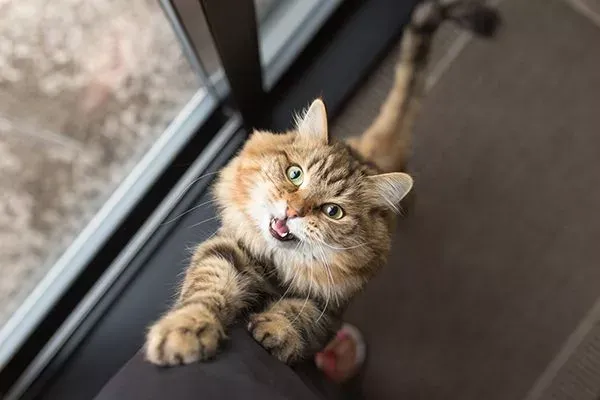If you’re wondering, cat meowing excessively is a common concern for many pet owners. Cats are naturally vocal, using meows, yowls, purrs, and hisses to communicate. However, when the meowing becomes constant and disruptive, it often signals an underlying issue. Whether it’s a plea for attention or a sign of discomfort, understanding these behaviors can help you restore harmony in your home.
Excessive meowing might start subtly but can escalate, especially at night or during specific routines like mealtime. For instance, if your cat won’t stop meowing at the door, it could tie into broader communication patterns. In this guide, we’ll break down the top six reasons behind cat meowing excessively and practical steps to address them, drawing from veterinary insights and real-world cat care experiences.
 cat meowing excessively
cat meowing excessively
What Does Excessive Meowing in Cats Mean?
Excessive vocalization varies by cat personality—some are chatterboxes by nature, while others are quiet. Generally, it’s excessive if it’s a sudden increase from your cat’s baseline, interfering with sleep, work, or daily life. According to the American Society for the Prevention of Cruelty to Animals (ASPCA), normal meowing is brief and purposeful, but persistent yowling warrants attention.
Veterinarians often note that cat meowing excessively peaks in certain life stages or situations. Track patterns: Does it happen before meals, at night, or around strangers? This context helps pinpoint causes, ensuring you respond effectively without overlooking health red flags.
Top Reasons Your Cat is Meowing Excessively
1. Seeking Attention or Boredom
Cats thrive on interaction, debunking the “aloof” myth. A bored or lonely cat may meow relentlessly for playtime or cuddles. In multi-pet homes or busy households, they might feel neglected.
From personal experience with rescue cats, interactive toys like feather wands reduce meowing by 50% within days. Spend 15-20 minutes daily playing, and observe cat actions to better read their cues. This strengthens your bond and prevents attention-seeking escalations.
2. Hunger, Thirst, or Basic Needs
One of the simplest triggers for cat meowing excessively is an empty bowl. Cats meow to request food, water, or access to litter boxes, doors, or cozy spots. Even if portions seem sufficient, they might demand more due to learned behavior.
Check bowls first—stale water or low-quality kibble can prompt complaints. Transition to measured feeding schedules with high-protein wet food for satisfaction. Owners report fewer meows after ensuring fresh resources twice daily, aligning with feline instincts.
3. Heat Cycles and Breeding Instincts
Unspayed females yowl loudly during estrus (heat), lasting up to a week monthly, while intact males respond to pheromones with increased vocalization. This instinctual drive for mating is natural but exhausting.
Spaying or neutering eliminates 90% of heat-related meowing, per the Association of American Veterinary Medical Colleges (AAVMC). If your cat is intact, consult a vet promptly—it’s a routine procedure improving health and behavior.
4. Stress from Environmental Changes
Cats are creatures of habit; moves, new pets, babies, or renovations spike stress hormones, leading to cat meowing excessively. Vet visits or loud noises amplify this.
Mitigate with pheromone diffusers like Feliway, stable routines, and safe hiding spots. One owner shared how a new scratching post resolved tension—explore solutions if your cat doesn t use scratching post. Patience during transitions restores calm.
5. Aging and Cognitive Decline
Senior cats (over 10 years) often meow more due to cognitive dysfunction syndrome (CDS), akin to human dementia. Vision/hearing loss, disorientation, or sundowning (nighttime confusion) prompts nighttime yowls.
Nightlights, consistent furniture layouts, and senior diets with antioxidants help. A study in the Journal of Feline Medicine and Surgery found 80% of CDS cats improve with vet-prescribed supplements. Regular check-ups catch early signs.
6. Underlying Medical Issues
Pain, hyperthyroidism, kidney disease, or hypertension cause constant discomfort, manifesting as cat meowing excessively. Increased thirst/hunger from diabetes also triggers vocal pleas.
Don’t delay: Schedule a vet exam with bloodwork. Early intervention, like thyroid medication, resolves symptoms quickly. The Cornell Feline Health Center emphasizes ruling out illness first, as untreated conditions worsen quality of life.
How to Stop Your Cat from Meowing Excessively
Addressing cat meowing excessively starts with observation—journal patterns and triggers. Meet needs proactively: enrich environments, maintain schedules, and ignore attention-seeking meows (reward quiet behavior instead).
If issues persist, professional help is key. Vets can diagnose via exams or tests, recommending diets, meds, or behaviorists. For litter-related stress, check litter box aggression.
Incorporate preventive care: annual wellness visits, dental checks, and weight management reduce risks.
Final Thoughts on Cat Meowing Excessively
Cat meowing excessively is rarely random—it’s your feline’s way of communicating unmet needs, stress, or health woes. By identifying causes like attention demands, breeding urges, or medical problems, you can implement targeted fixes for a quieter home.
Prioritize spaying/neutering, routine vet care, and mental stimulation for long-term peace. Your cat’s vocalizations are a trust signal; respond with empathy and expertise. Consult a veterinarian for personalized advice, and explore more cat care tips on our site to keep your pet thriving.
References
- ASPCA: Understanding Feline Vocalizations
- AAVMC: Spaying and Neutering Benefits
- Journal of Feline Medicine and Surgery: Studies on CDS in Cats
- Cornell Feline Health Center: Hyperthyroidism in Cats
